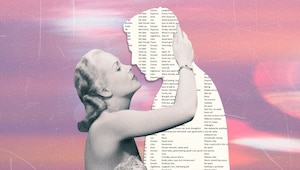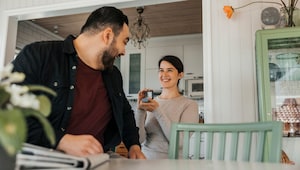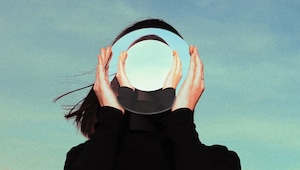Here’s What Dating as a Demisexual Is *Really* Like, According to Three People

Millennials and Gen Zs are the queerest generations in history. According to a 2020 Gallup poll, 15% of Gen Z adults, 9.1% of Millennials, and 5.6% of US adults overall identify as LGBTQ. As scores of people are determining where their place—or places—lie on the sexuality spectrum, a little-explored identifier has made recent headlines.
Demisexuality is a sexual orientation that describes someone who doesn’t find themselves sexually attracted to people they don’t already know or feel an emotional connection with. They can feel sexual feelings towards others, but not until they've gotten to know them and bonded on a deeper level. One common misconception about demisexuality is that it's no different from choosing to abstain from sex, but that's simply not true. People who choose to abstain from sex can still look at others in a sexual way and feel attracted to them, but being demisexual means you don't physically feel that sexual attraction unless you've already connected emotionally.
When Michaela Kennedy-Cuomo, daughter of former New York governor Andrew Cuomo, came out as demisexual in July 2021, conservative commentators like Ben Shapiro went off. Via Twitter, Shapiro wrote: “Being a member of the intersectional coalition is now so alluring that we’re making up terms like ‘demisexual’ so that people can join.”
Since then, several outlets including The Guardian have covered demisexuality, outlining its history and theorizing why younger generations are embracing the identity now more than ever. Because while many, like Shapiro, may remain confused, demisexuality is more common than you might think.
Cosmopolitan caught up with a few openly demisexual people to learn more about their experience with the identity, what dating looks like for them, and what they wish more people understood about demisexuality.
When and how did you begin to realize you were demisexual?
Jeffrey: Growing up, I started to notice my friends could see people they were attracted to in a sexual way. I could acknowledge when someone was attractive, but it wasn't the same. By high school, I felt like I was probably gay, but I still had never really experienced a crush on anybody. My friends told me later they just assumed I was asexual. It wasn’t until after high school when I finally found someone immediately attractive. He was so funny and nice, and the combination of traits really made me just want to be physically close to him. It felt like the beginning of an emotional connection I’d never felt before. To me, there was always something more thrilling about romance than there was about sex. I loved the attention, being romanced, and getting to know someone, I just wasn’t aroused by hooking up. I was so down to explore sexually, but I just couldn’t do it.
Vanessa: In my late 20s, I had a close friend ask me why I only ever dated my friends and not people I've just met. So, I stepped back and went, “Is there a name for that?” We did some research to see if there was a word for it, and it turns out, there is. I had a fairly sheltered upbringing, and I always knew I was somewhere on the LGBTQ+ spectrum, but I had no idea that needing that connection with someone the way I do was also a thing until that moment. I don't want to be with anybody who I don't care about deeply. In fact, I just can't. My brain and my body do not respond.
Lindsey: I was probably in my early 20s when I realized something was up. I’d seen all my friends date and lose their virginity, and I hadn’t—and I still haven't. I've just never felt any rush. I knew I was attracted to men, but I felt something was wrong somehow, so I started doing research. I'm a hopeless romantic, so I knew I wasn’t demiromantic. I really considered seeing a psychologist and would ask my parents often if they thought there was something wrong with me. I ended up taking a quiz I saw somewhere on Twitter and got a demisexual result, so I started Googling what it meant. I’ve always been attracted to minds more than anything, and part of being demisexual means establishing a mental connection with someone. As I read more, I knew that was it. I’ve waited this long, there’s no way I’ll ever open myself up physically without having a deeper connection to make it worthwhile.
How has dating changed for you since identifying as demisexual?
Jeffrey: Before I knew what demisexuality was, I jumped into a relationship with my first boyfriend. I never really loved him, and I also didn’t know what I preferred sexually. It was bizarre having sex with someone I wasn’t attracted to or turned on by. After that experience, I learned how to talk about it and tell guys early on how I felt and what I preferred — that I’d rather wait to go further until I knew them better and felt a deeper attraction. Guys always loved it. I never had any issues with talking about it or how it was received. It was awkward for me, but not enough to be too afraid to discuss it. I know what to expect from myself now, almost down to a science. Typically, it takes about a month for my body and my unconscious mind to decide I want to have sex with somebody. If my body and mind don’t click, it just never happens.
Vanessa: I’ve experienced frequent flack for being demisexual. I’ve gotten a lot of, “Is that even a thing?” I think people are afraid of what they don't understand, which is a normal human reaction. Realizing I had to get to know someone on a deeper level before being sexually attracted to them broadened things for me because I realized I didn't only have to date my friends. I just had to feel close to someone. Now, sometimes, I can realize I don't want to be in a relationship with someone, but care about them enough that I can sleep with them.
Lindsey: I actually haven’t been dating at the moment because of the pandemic, but I do want to. I know what and who I am now, so I imagine that process to be easier because I know exactly what I’m looking for. But in some ways, it also feels like it could be harder to find someone who also wants that connection without wanting to hook up right away. At any rate, I’m not in a rush. I want it to happen organically.
If you’re queer, what does the intersection of queerness and demisexuality look like? Any specific experiences that you’ve found more difficult? Easier?
Jeffrey: When I went to college, I was excited to learn about sex and hookup culture in the gay community. Sex is such a big part of being human, and I was ready to embrace it. But coming out as demisexual to other people, at least for me, wasn't the hard part. Coming out as demisexual to myself was difficult. I do think, for gay people, it's probably easier to acknowledge that something feels different. I think you're much less afraid to be different after you've already come out, so I would guess that queer people would discover that they’re demisexual faster than straight people because they already have experience with introspection on identity.
Vanessa: My experience has been complicated. I’m Gen X, which has historically been more closed-minded, so much so that a lot of my friends didn’t come out until much later in their lives because they grew up in spaces where they couldn't. For me, it's always been kind of a difficult conversation to have with anyone. I have to let them know I care about them probably more than they care about me, but that's necessary for me. A lot of times, it causes them to shut down because they're uncomfortable with the idea of someone loving them at all.
What’s the biggest misconception about demisexuality?
Jeffrey: That it’s a choice. Like any sexual identity, people think it’s a conscious decision, but it’s not. It’s not something anyone chooses and it’s exclusive from morality or an aversion to sex.
Vanessa: The biggest one I’ve experienced is that you have to be completely, fully in love to be able to sleep with someone. I have to have love for the person, but that doesn't mean I have to be in love with them. I could fall in love with many people. I’ve often been asked, “How much do you have to care about someone before?” and that's usually from someone trying to get in my pants. My response is there's no set amount of time or list of things you can do that suddenly become the key to unlocking me. It doesn’t work that way.
Lindsey: I think the demisexual community could probably be perceived as hyper-judgmental about sex. But that’s not true. If anything, I feel like demisexuals are very open because we desperately want to find someone we can establish emotional connections with. I understand everyone works differently, but for us, it just takes a little bit more time.
What would you say to someone who's trying to figure out if they're demisexual?
Jeffrey: Just be open about it. Demisexuality might be a bit more common than we even realize, and talking about it helps. I know I’ve helped other people determine they were demisexual, too. I’m transparent about my sexuality, and I can tell when people I’m with resonate with what I’m saying and begin to feel more comfortable identifying themselves as well.
Lindsey: I would definitely suggest joining some kind of group–online or in-person. Finding a space where you can talk to people and hear about their experiences is so helpful. Also, as toxic as Twitter can be, I’ve found a lot of great psychologists and sex educators there that have been great resources for me.
more from Life

Is Gen Z going analogue amid an epidemic of disconnection?

Inside the rise of impossible-to-ignore cakes and the bakers making them worth the splurge

Genius hack or pathway to loneliness? The dawn of dating’s spreadsheet era

I tried Pantene's Bond Repair Conditioner and here’s what it changed about my styling routine

Low-rise jeans are squeezing back into fashion—here’s how to wear them in 2026

I travel for a living—these are the top 15 tips I've learned to avoid skin freak-outs and overweight luggage

All the hottest beauty finds that make us sit up and take notice

Will we ever stop hating it when women propose to men?

Breezy summer outfits that keep you cool and effortlessly chic

Are you an “echoist?”
